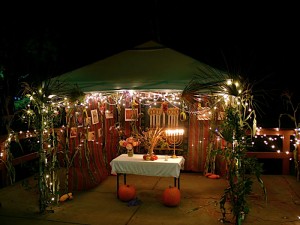The Day of the Lord May Not Be What You Expect by Heather McCance
Spirited Reflection — Sunday, February 15, 2015
Heather MCance is The Rev. Canon, Church of St. Andrew Scarborough
The phrase “The Day of the Lord” had been used by God’s prophets for centuries to denote a time when Yahweh God would come and bring justice to God’s people, would cause peace to reign, ending all oppression and establishing shalom.
It had come to be associated with Sukkot, the Jewish festival of booths, a harvest festival in which the people created temporary booths, or tabernacles, and lived in them for a week to recall their days living in temporary shelters in the wilderness of Sinai. During the celebrations, passages from the prophets (including Zechariah 14) were read, foretelling the Day of the Lord when Messiah would come and the enemies of Israel would be expelled.
I found this background helpful this year as I revisited the story of the Transfiguration, for it helped to interpret Simon Peter’s response to the event. Jesus is transfigured before them, his clothing glowing brightly white. Moses, representing the Law and Elijah, representing the prophets, appear with Jesus. These things, with Peter’s own belief that Jesus was the long-awaited Messiah, prompted a realization: this, right here on this mountain, must be The Day of the Lord. Right now, today, Yahweh will restore all justice and shalom to God’s people.
Peter’s response is one deeply informed by the traditions and expectations of a lifetime steeped in Jewish culture and traditions. The Day of the Lord is the ultimate Sukkot; we must build the booths!
But then comes the voice from heaven, and the flash of brightness, and then all seemingly returns to normal. Moses and Elijah are gone. Jesus appears just as he did before, and encourages them back down the mountain and heading toward Jerusalem and all that would happen there.
In some ways, the coming of this particular “Day of the Lord” made no difference at all.
Yet for Peter and James and John, this was about far more than simply (simply?!) experiencing the supernatural power of God in a show of thundering voice and flashing lights.
For they had expected God to show up in one, pre-determined way, as the Lord God of the nation of Israel. They had thought Messiah would come in the way they’d always been told, as a conquering king and military hero. They had expected that the coming of shalom would be about the enemies of Israel leaving their land, the re-establishment of the David line on the throne of Jerusalem.
The experience on the mountain transformed the three disciples, perhaps even more than it had transformed Jesus. For after this event, which seemed to be about the Day of the Lord in the ways they’d expected, they were forced to re-examine their expectations. After seeing Moses and Elijah, after hearing the voice, their faith that Jesus was Messiah was affirmed, but what that meant was suddenly, radically, open to question and reinterpretation.
It meant that when God didn’t appear as a vengeful God punishing the national enemies of Israel, that when Messiah failed to raise an army, when the political power of the day remained unchanged, they were now able to see past their dashed expectations to see what new thing God would do.
They were able to see God’s ultimate power in the powerlessness of a betrayed man, broken and dying on a cross.
When do our expectations of what God is supposed to do, of how God is supposed to act, keep us from seeing when God does a new thing in a new way in our midst today?




